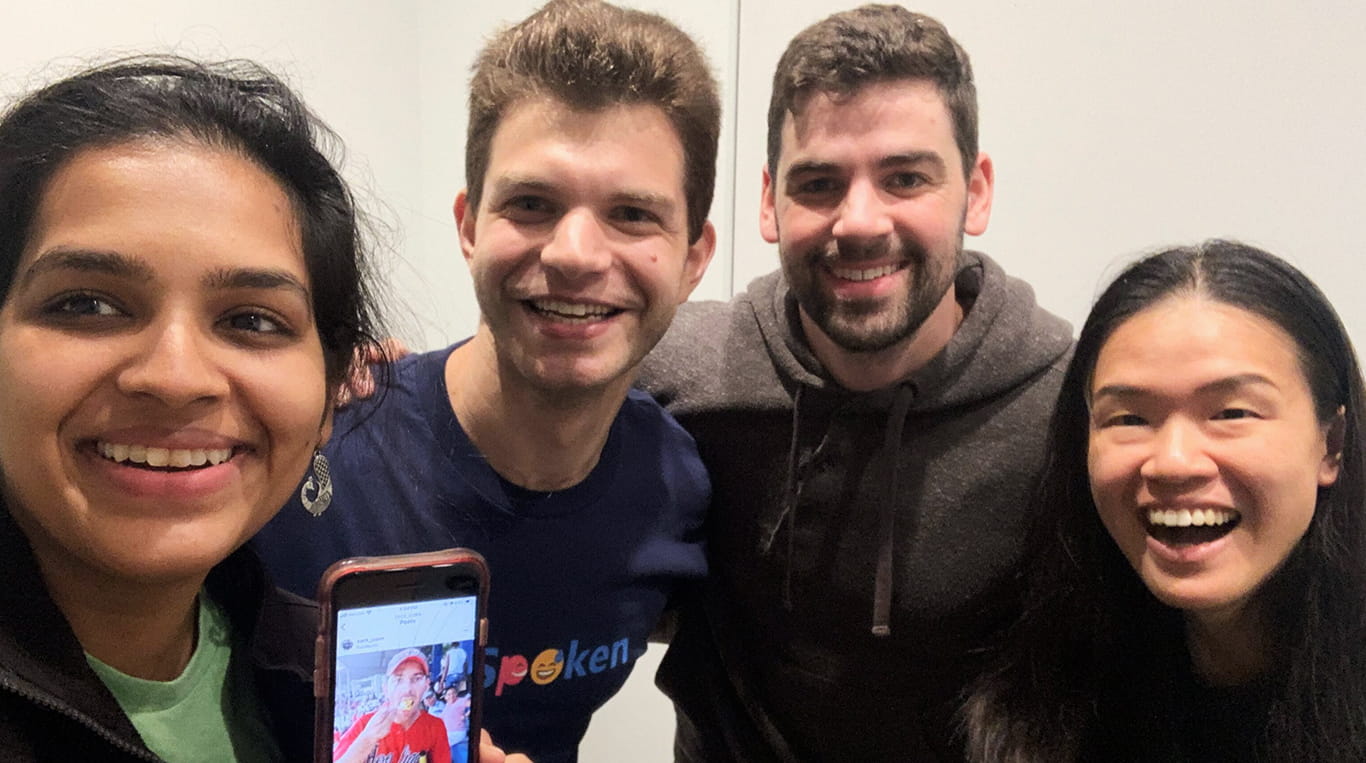The language of opportunity, and unlocking your entrepreneurial spirit

Life is all about pivoting, and David Waldinger, co-founder and chief marketing officer at BeSpoken Language, knew that he wanted to make the jump from big company culture into the start-up space when he started his MBA journey at Kellogg. Learn about how his classroom opportunities opened the door for real-world innovation.
Intentional entrepreneurship
I came to Kellogg for one reason above all others: to pivot from a large tech company I had previously worked at to the startup space. Reflecting on my work experience so far, I realized I worked best when I could wear many hats. I’m never the best at any one thing, but I excel at connecting several seemingly separate things (putting my liberal arts education to good use!). Startups seemed like the best opportunity to pursue exactly that; the niche of jack of all trades, master of none, and Kellogg looked like the best place to discover innovation and startups.
As soon as I got to Kellogg, I threw myself into as many entrepreneurship opportunities as I could from the Garage’s startup matchmaking process to an in-quarter internship at an existing Kellogg startup. Try as I might, I couldn’t find the perfect idea, one exciting enough to devote myself to and bear the myriad frustrations that come along with the joys of the startup lifestyle.
Wouldn’t know a good idea if it scheduled a coffee chat
And then, when the idea found me, I resisted it! At the start of our New Venture Discovery class, my classmate Celia pitched me her idea to start a language learning platform. She knew I had worked in Madrid as an English teacher, so she correctly inferred that I had already lived on both sides (studying and teaching) of the language learning experience.
For reasons I still don’t understand (but certainly laugh about), I resisted this idea and tried to recruit a team for my own idea. What I forgot was that this concept was perfect for me: I grew up learning Spanish in school, but I always preferred it outside of the classroom. I fondly remember accidentally telling our Peruvian porters that I was 40 years old instead of 14. I got to serve as the in-class interpreter for a high school classmate who had just moved from Colombia and spoke no English, and we ended up just chatting instead of engaging with class content. But my greatest language experiences were studying at university and then teaching in Madrid. I now can’t help but switch into Spanish the moment I learn someone is a native speaker, and the hilarious differences and oddities of languages are topics you just can’t get me to shut up about at parties. Reader, if we ever meet, you’ve been warned.
Finding our pain point
Thankfully, I failed to convince enough of my classmates to join my team, so against my will, I was placed in the language learning group. It took no time at all for me to realize this was the compelling idea I had been looking for. We started interviewing as many language learners and teachers as possible to get insights about possible pain points, so I quickly remembered how much I could relate to the problems so many people encountered. We heard over and over again that people would study a language in the classroom or through an app for years, but when they finally tried to communicate in that language, they felt ill-equipped and terrified of embarrassing themselves. They felt alienated from their communities, scared of situations like doctor’s or bank visits and unable to express their true selves in their new language. I could certainly relate from my time in Madrid.
My friend Samuel, a polyglot who taught his native French in Italy just as I taught English in Spain, put it best: language should never be taught in the classroom. Academia is too focused on what’s measurably correct and testable while verbal communication is all about just getting the idea across whether or not you’re technically accurate with every word.
Most importantly, he said, mistakes should be celebrated, not punished, since they are signs of learning and growth. With that mantra of celebrating mistakes, Celia, Zack, Alex, and I founded BeSpoken, the language learning platform designed to help you overcome your linguistic anxiety.
Development and launch
The New Venture course doesn’t just stop with Discovery; we were accepted into New Venture Development the next quarter and New Venture Launch for our very last quarter at Kellogg. Between Development and Launch, we iterated on several prototype versions, created an MVP, and even launched our beta to glean insights from real (and paying!) customers.
Throughout this process, we were blessed with advice and support from faculty like our New Venture Discovery Professor Stephanie Farsht as well as Megan Kashner, director of social impact. All the while, we kept talking to customers and hearing more about their journeys in learning languages which gave me as much life then as it did when we started all the way back in Discovery.
What’s beyond
Along the way, we welcomed Anjani, a stellar intern who has since become our Chief Operating Officer, to the BeSpoken team. She and three of us co-founders are continuing to work on BeSpoken even post-graduation. We’re always eager to talk to language learners, so if you or someone you know is interested in becoming more confident with their English, shoot us an email at team@bespokenlanguage.com. We look forward to celebrating “mistakes” with you soon.
